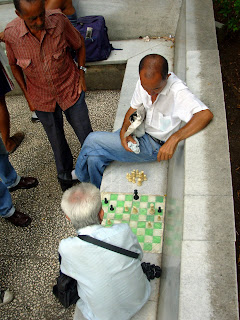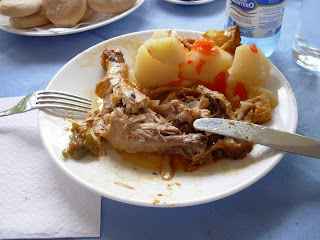Near the end of his appearance last week on A Mano Limpia on Miami’s Channel 41, Lt. Col. Chris Simmons explains that “we got played” by Cuban intelligence when U.S. agents detained Luis Posada Carriles and when Santiago Alvarez was sent to jail on a weapons charge.
Why? Because these men were top targets of Cuban intelligence.
Never mind Posada’s background or the fact that the Bush Administration itself calls him a terrorist.
Never mind that Alvarez pleaded guilty after machine guns, a silencer, a grenade launcher, and other weapons were found stored on property he owns in Broward County. (He entered the plea, the Herald reported, after a mean-spirited judge rejected a “proposal to include Cuban Americans from Miami-Dade County in the Broward County jury pool.”)
No, we got played because Simmons accuses an FBI informer in the case of being a double agent, and because U.S. law enforcement acted against two people whom Cuban intelligence identifies as enemies.
If Fidel’s for it, I’m against it. With that mindset, Simmons is going to do very well in Miami.
He’s certainly doing well on A Mano Limpia, where host Oscar Haza treated him with the journalistic gentleness we only see when Randy Alonso meets his comandante en jefe. It was less an interview than a chat where the host mainly nudges the guest from one topic to another – guided in this case by the notes from which Simmons read. The program, with a bad voice-over translation, is linked at Penultimos Dias.
In this hour, Simmons smilingly accuses four people of serving as agents of influence for Cuba.
Simmons is a U.S. Army officer. The Defense Intelligence Agency refers to him as a “former employee.” In his spare time he and a collection of former Cuban intelligence officers work at an organization he founded. His bio makes it appear that he worked on Cuba issues for eight years, ending in 2004.
Simmons made his accusations, he said, based on his conversations with former Cuban intelligence officers. Haza, to his credit, did ask if these Cubans might be lying; Simmons said there’s “no possibility” of that. Well, that settles that!
Simmons spoke at most length about Alberto Coll, who was convicted in 2005 of lying on U.S. government forms regarding trips he had taken to Cuba while serving as a professor at the Naval War College. Coll served earlier as an assistant secretary of defense for special operations and low-intensity conflict, and had taught at Georgetown University. Simmons said that Coll is “absolutely” a Cuban agent.
When Coll faced charges related to that travel violation, rumors abounded that he was being investigated for espionage. Haza asked if Simmons had anything to do with the Coll investigation. Simmons said he would “rather not say.” Haza politely left it at that.
But Simmons insisted that there was more to Coll’s story, even though the prosecutor in the case said on the record to journalist Ann Louise Bardach, that “we recognized this was not the crime of the century, and that’s why we recommended the lowest possible punishment – something we never do.”
Simmons’ Cuban sources tell him that Coll met twice in Havana with Cuban intelligence officers, once in a public restaurant! Simmons said there was an “anomaly” in Coll’s behavior that proves he’s a Cuban agent. What was the anomaly? Simmons didn’t say. Haza didn’t ask.
In fact, Simmons never said what Coll actually did as an agent of influence. He said – surprise – that Coll spoke to his superiors after his Cuba trips. Did he disinform them or other U.S. officials? Simmons didn’t say, and Haza didn’t ask.
Similarly, while at the Pentagon, Coll was in a position to “counsel and inform” the Cuban government about U.S. special operations. And throughout his academic career, Coll was in a position to screen students, identifying potential sympathizers whom Cuban agents could later recruit. Did he actually do these things?
You get the idea.
Simmons charges that Gillian Gunn Clissold is a Cuban agent, again without evidence. He identifies her as a Trinity University professor, a job she left years ago. He claims, as if he speaks for the Justice Department, that she was never prosecuted because she’s a British subject, which makes you wonder if he has read a newspaper during the Bush Administration.
Simmons worked in a smear of the Cuban American National Foundation – a long-standing, pro-embargo organization that now favors expanded travel to Cuba, and has drawn hardliners’ ire. He noted that Coll was offered a top job there in 1987, and he expressed his assumption that the Foundation is penetrated by Cuban intelligence, no evidence offered. Say what you will about Simmons, he knows the market segment he’s going for.
Simmons is writing a book with a Miami woman who had a relation with a man whom she did not know to be a Cuban agent, and was abandoned when the agent abruptly returned to Cuba.
I wish him well in that pursuit, but he is showing himself now to be a mediocre smear artist. He portrays himself as an expert on one of the world’s top intelligence services, a service that operates in a language he can’t speak. Simmons trades on his government experience, and on the uniform he wears, to level grave charges against American citizens. He offers no evidence but his own judgment, and conversations he has supposedly had with former Cuban officials. His assertions make for good television in the 305 area code, but they are not backed by anyone in government who has the courage to speak in public.
More important, it doesn’t inspire confidence that our government put a person such as this up against one of the world’s top intelligence services. Watch the program and judge for yourself, but this example jumped out at me. Simmons noted that Coll has the same alma mater, the University of Virginia, as convicted spy Ana Montes, which establishes a “trend” – “certain universities that are associated with Cuban intelligence.”
By my count, there are 20,356 students enrolled now at the University of Virginia. Better get busy, Colonel.
[Update: A reader asked, with good reason, why I discussed only three of the four people whom Lt. Col. Simmons accused of being Cuban agents of influence, omitting Marifeli Perez-Stable. I meant nothing by the omission. Her views on Cuba are in the public domain, and they are critical; moreover, she has openly discussed how her views have evolved. If we are going to go back to the 1960’s and 1970’s to find people whose sympathies or affiliations were with The Revolution, and cross them all off our lists, then we have a lot of crossing off to do – including much of the dissident community in Cuba today. Again, this was a case where Simmons made a charge but failed to say what the accused actually did, in this case about 40 years ago. From a showbiz point of view, readers might want to check the video where Simmons mentions her name, mangling the pronunciation, and Mr. Haza acts extremely surprised even as his producers put her image up on the screen behind him.]















